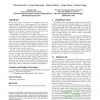Free Online Productivity Tools
i2Speak
i2Symbol
i2OCR
iTex2Img
iWeb2Print
iWeb2Shot
i2Type
iPdf2Split
iPdf2Merge
i2Bopomofo
i2Arabic
i2Style
i2Image
i2PDF
iLatex2Rtf
Sci2ools
105
click to vote
SIGMETRICS
2008
ACM
2008
ACM
Epidemic live streaming: optimal performance trade-offs
Several peer-to-peer systems for live streaming have been recently deployed (e.g. CoolStreaming, PPLive, SopCast). These all rely on distributed, epidemic-style dissemination mechanisms. Despite their popularity, the fundamental performance trade-offs of such mechanisms are still poorly understood. In this paper we propose several results that contribute to the understanding of such trade-offs. Specifically, we prove that the so-called random peer, latest useful chunk mechanism can achieve dissemination at an optimal rate and within an optimal delay, up to an additive constant term. This qualitative result suggests that epidemic live streaming algorithms can achieve near-unbeatable rates and delays. Using mean-field approximations, we also derive recursive formulas for the diffusion function of two schemes referred to as latest blind chunk, random peer and latest blind chunk, random useful peer. Finally, we provide simulation results that validate the above theoretical results and all...
Related Content
| Added | 15 Dec 2010 |
| Updated | 15 Dec 2010 |
| Type | Journal |
| Year | 2008 |
| Where | SIGMETRICS |
| Authors | Thomas Bonald, Laurent Massoulié, Fabien Mathieu, Diego Perino, Andrew Twigg |
Comments (0)

